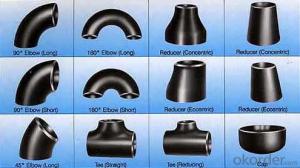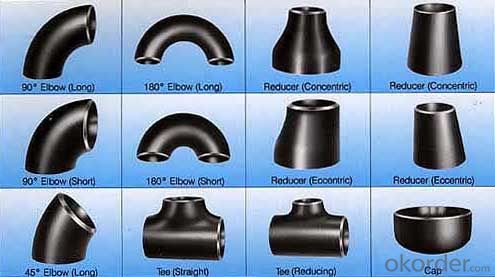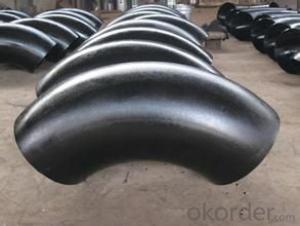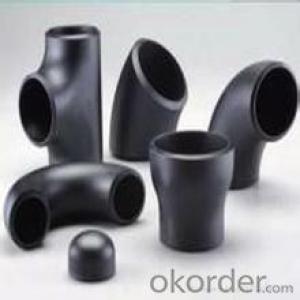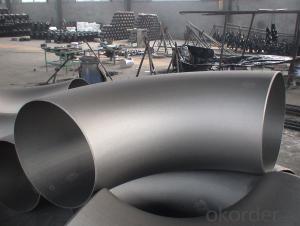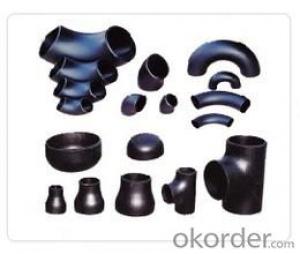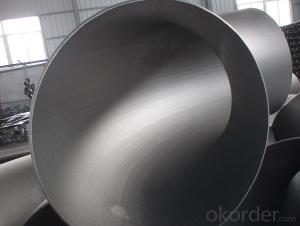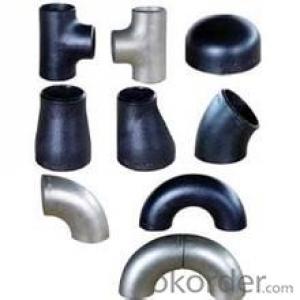CARBON STEEL PIPE FITTING TEE BEND ELBOW FITTINGS
- Loading Port:
- Tianjin
- Payment Terms:
- TT OR LC
- Min Order Qty:
- 5 m.t
- Supply Capability:
- 300 m.t/month
OKorder Service Pledge
OKorder Financial Service
You Might Also Like
Products Detailed Description
Products | pipe fittings elbows, bends,tees, reducers caps |
Size | 1/2" - 48" |
Wall thickness | Sch5-Sch160 XXS |
Standard | ANSI, ASME API5L, OCT, DIN and JIS, etc. |
we can also produce according to drawing and standards provided by customers. | |
Material | Carbon steel, alloy steel and stainless steel. |
We can produce according to materials appointed by consumers. | |
Packaging | Plywood Cases,plywood pallet, plastic bag or as customers requirement |
Surface Treatment | Shot blasted, rust-proof black oil |
Delivery Time | 10-60 days |
Quality | First grade |
Others | 1.Special design available according to your drawing. |
2.anti-corrosion and high-temperature resistant with black painting | |
3. All the production process are made under the ISO9001:2000 strictly. | |
4. A conformity rate of ex-factory inspection of products. |
Specifications
Ansi B16.9 WPB carbon steel pipe fitting elbow tee reducer
Size:Seamless 1/2"-24" Welded 1/2"-48"
ANSI B16.9 WPB carbon steel pipe fitting elbow tee reducer
1.Size: Seamless 1/2"-24" Welded 1/2"-48"
2. WT: SGP, STD, SCH40, SCH80, SCH100,SCH120,SCH160,XS,XXS
3. Material:
stainless steel Grade: 201,304,304L,316,316L,317,317L,904L,and etc
carbon steel Grade: WPB,GRB, Q235,16MN
Alloy steel: st35.8,st52,wp11,wp22,wp12 wp l6
4. Standard: ASTM/AISI/DIN/JIS
5. Type: Concentric and eccentric
6. Surface treatment: Transparent oil, rust-proof black oil
7. Applications range: Applications range: for use in the petroleum, smelting, foodstuff, power, papermaking, chemical, medical equipment,aviation, boiler heat exchanger, and other fields
8. Packing: wooden case or as per customers' requirement
- Q: What are the different sizes of steel pipe nipples?
- The sizes of steel pipe nipples vary depending on their intended use and application. Common sizes include 1/8", 1/4", 3/8", 1/2", 3/4", 1", 1 1/4", 1 1/2", and 2". However, there are many other sizes available to cater to specific needs and requirements.
- Q: What is the shear strength of steel pipes?
- The shear strength of steel pipes can vary depending on various factors such as the grade of steel, size and thickness of the pipe, and any additional treatments or coatings applied. Generally, the shear strength of steel pipes is high due to the inherent strength of steel, making them suitable for various structural and industrial applications.
- Q: What is the maximum allowable deflection for steel pipes?
- The maximum allowable deflection for steel pipes is typically determined by industry standards and design codes. These standards and codes specify the acceptable limits of deflection to ensure the structural integrity and functionality of the pipes. The maximum allowable deflection varies depending on various factors such as the pipe diameter, wall thickness, material properties, and the type of application. It is important to consult the relevant standards and codes, such as the American Society of Mechanical Engineers (ASME) B31.3 code for process piping or the American Water Works Association (AWWA) standards for water transmission and distribution pipes, to determine the specific maximum allowable deflection for a particular steel pipe application. Following these guidelines helps to ensure the safe and efficient operation of steel pipes in various industries and applications.
- Q: Can steel pipes be used for underground water supply?
- Indeed, steel pipes possess the capability to be employed in the provision of underground water. Due to their robustness, durability, and resistance to corrosion, steel pipes prove to be appropriate for a wide range of uses, including underground water supply. Nonetheless, it is imperative to utilize steel pipes that are explicitly manufactured for underground purposes and are furnished with a protective coating or lining to thwart corrosion. Furthermore, the installation and upkeep of these steel pipes must be conducted diligently to guarantee their long-term resilience and effectiveness within an underground water supply system.
- Q: How are steel pipes used in the manufacturing of sewage treatment plants?
- Steel pipes are commonly used in the manufacturing of sewage treatment plants for various purposes such as conveying wastewater, transporting chemicals and gases, and facilitating the distribution of treated water. They provide durability, corrosion resistance, and structural stability necessary for the efficient and reliable operation of sewage treatment processes.
- Q: How do you calculate the flow rate of water in steel pipes?
- To calculate the flow rate of water in steel pipes, you can use the equation Q = A × V, where Q represents the flow rate in cubic meters per second, A denotes the cross-sectional area of the pipe in square meters, and V represents the average velocity of the water in meters per second.
- Q: Are steel pipes more expensive than other types of pipes?
- Steel pipes can be more expensive than other types of pipes, but this can vary depending on various factors such as the size, grade, and specific application requirements.
- Q: What are the different grades of steel used for manufacturing pipes?
- The different grades of steel used for manufacturing pipes vary depending on their intended applications. Some common grades include carbon steel, stainless steel, and alloy steel. Carbon steel is commonly used for general-purpose piping due to its affordability and strength. Stainless steel is preferred for corrosive environments or high-temperature applications due to its resistance to corrosion. Alloy steel, on the other hand, offers improved strength and durability and is often used for specialized applications such as oil and gas pipelines.
- Q: How are steel pipes used in agriculture?
- Steel pipes are commonly used in agriculture for a variety of purposes, such as irrigation systems, water supply lines, and drainage systems. These pipes are durable, resistant to rust and corrosion, and can withstand high pressure, making them ideal for transporting water and other fluids across farmland. Additionally, steel pipes are used to construct structures like greenhouses, fencing, and livestock enclosures, providing strength and stability to support agricultural operations.
- Q: What are the different methods of lining steel pipes?
- There are several methods of lining steel pipes, including cement lining, epoxy lining, polyethylene lining, and bituminous lining. These methods are used to protect the inside surface of the steel pipes from corrosion, erosion, and other forms of damage, ensuring their longevity and optimal performance.
Send your message to us
CARBON STEEL PIPE FITTING TEE BEND ELBOW FITTINGS
- Loading Port:
- Tianjin
- Payment Terms:
- TT OR LC
- Min Order Qty:
- 5 m.t
- Supply Capability:
- 300 m.t/month
OKorder Service Pledge
OKorder Financial Service
Similar products
Hot products
Hot Searches
Related keywords
